中考英语常考易错知识点
初中英语-中考英语必备-易混淆知识点总结
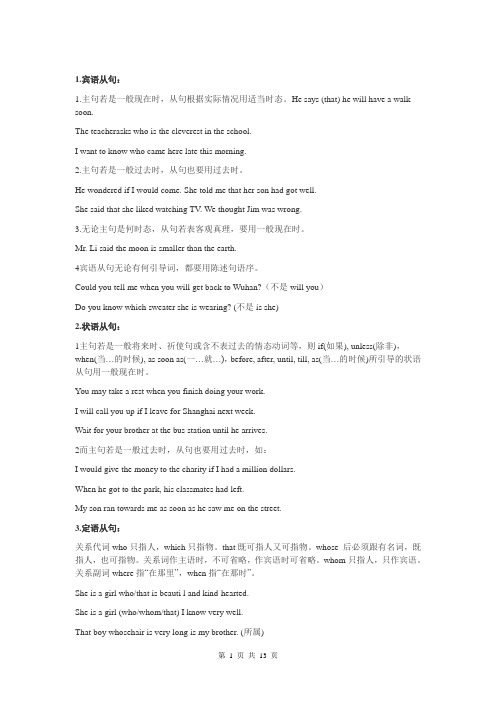
1.宾语从句:1.主句若是一般现在时,从句根据实际情况用适当时态。
He says (that) he will have a walk soon.The teacherasks who is the cleverest in the school.I want to know who came here late this morning.2.主句若是一般过去时,从句也要用过去时。
He wondered if I would come. She told me that her son had got well.She said that she liked watching TV. We thought Jim was wrong.3.无论主句是何时态,从句若表客观真理,要用一般现在时。
Mr. Li said the moon is smaller than the earth.4宾语从句无论有何引导词,都要用陈述句语序。
Could you tell me when you will get back to Wuhan?(不是will you)Do you know which sweater she is wearing? (不是is she)2.状语从句:1主句若是一般将来时、祈使句或含不表过去的情态动词等,则if(如果), unless(除非),when(当…的时候), as soon as(一…就…),before, after, until, till, as(当…的时候)所引导的状语从句用一般现在时。
You may take a rest when you finish doing your work.I will call you up if I leave for Shanghai next week.Wait for your brother at the bus station until he arrives.2而主句若是一般过去时,从句也要用过去时,如:I would give the money to the charity if I had a million dollars.When he got to the park, his classmates had left.My son ran towards me as soon as he saw me on the street.3.定语从句:关系代词who只指人,which只指物。
中考英语78个易混易错单词+短语+句型(全)
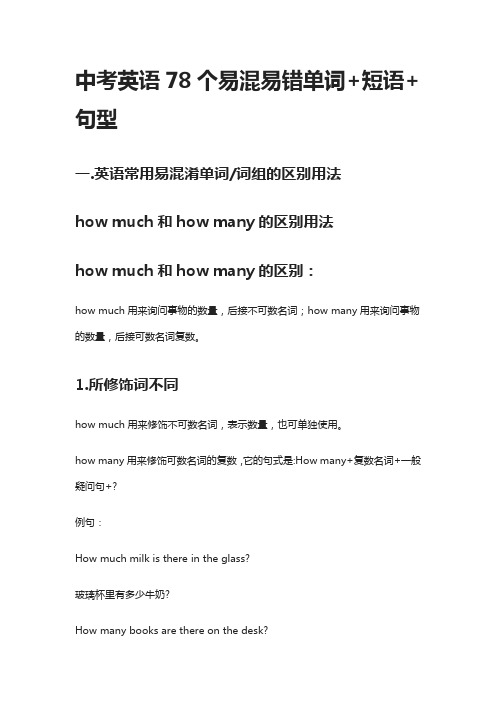
中考英语78个易混易错单词+短语+句型一.英语常用易混淆单词/词组的区别用法how much和how many的区别用法how much和how many的区别:how much用来询问事物的数量,后接不可数名词;how many用来询问事物的数量,后接可数名词复数。
1.所修饰词不同how much用来修饰不可数名词,表示数量,也可单独使用。
how many用来修饰可数名词的复数,它的句式是:How many+复数名词+一般疑问句+?例句:How much milk is there in the glass?玻璃杯里有多少牛奶?How many books are there on the desk?有多少本书在桌子上?2.用法不同How much 表示多少钱,用来问价格。
例句:How much is this dress?这个连衣裙多少钱?How many 表示多少,用来问数量。
例句:How many apples do you have?你有多少苹果?in和on的区别用法:当我们表示某些东西被其他东西所包围时使用“in”这个词。
而“on”用于描述物体被放置在其他物体上方或外部的情况。
in可表时间,表地点,表手段、方法、材料。
on表示时间、地点、方位等。
1.意思不同in:prep.在 ... 里;在 ... 地方;在 ... 期间on:prep.在 ... 之上2.用法不同in:in着重一段时间的过程,常用于重复动作或延续动作。
in表示从现在时间算起推移到将来的一段时间之后,一般与将来时态连用。
He is a layman in economics.他对经济学一窍不通。
on:表示“在物体的表面上”,只能用on的表达方式有on the next morning,on the following。
The spider is walking on the ceiling.蜘蛛在天花板上爬行。
3.侧重点不同in:表示“在其中”。
中考英语常考易错知识点

中考常考易错题总结一:易混动词1.几个“花费”:spend,take,pay,cost1 spend多用人作主语,后接金钱或时间;spend...onsth/indoingsth;如:Ispent15yuan onthisnewbook.买这本新书我花了15元;2 take常用于“Ittakessbsometimetodosth”句型中;如: Itoftentakesmehalfanhourtogotoschoolbybikeeveryday.我每天骑车去学校要花半小时;3 pay常与for连用,表“付给……款”;如:Ipaid15yuan forthisnewbook.4 cost常用物作主语,表“价值或花费多少钱”;如:Thisnewbookcostsme15yuan.2.几个“看”:look,see,watch,read,findlook看,表动作,lookat;see看见,表结果;也可说看电影“seeafilm”;watch观看比赛、演出、电视等;read读书看报等文字材料;3.几个与“看”有关的词或词组:lookfor,find,findout,lookafter,takecareof,lookover,lookforwardtolookfor寻找,表过程;find发现,找到,表结果;findout找出,查明;lookafter,takecareof均表示“照看,照顾”;lookover检查、翻阅等;lookforwardto盼望……,期待……;4.几个“说”:say,speak,talk,tell1 say用作及物动词或不及物动词;用作及物动词时,侧重说的内容;say用作不及物动词时,不涉及所说的内容;如:PleasesayitinEnglish.这个请用英语说;It'shardtosay.很难说;Easiersaidthandone.说起来容易,做起来难;say之后通常跟直接引语、间接引语或宾语从句;如:Theteachersaid,“Pleaselookatme.”老师说:“请看着我”; Ourteachersaidthattheearthgoesaroundthesun.老师说地球围绕太阳运行;含有say的固定搭配和常见的句型有:saytooneself自言自语;say“Hi/Hello”tosb.向某人问好;havenothingtosayto对……无话可说;sayagoodwordforsb.为某人说好话;Theysay.../It'ssaid...据说……;Thatistosay那就是说;2 speak常指能说某种语言,打电话时常用它表示说话,也有“演讲”的意思,不强调说话的内容;如:WecanspeakChineseandEnglish.我们可以说汉语和英语;MayIspeaktoHenry我可以和亨利讲话吗Hewillspeakatthemeetingtonight.他将在今晚的会议上发言;3 talk用作不及物动词,作“说话”讲时与speak可以互换使用;作“交谈”讲时,通常与介词to/with连用;如:Thebabycan'ttalkyet.那个婴儿还不会讲话;TheyoftentalkinEnglish.他们经常用英语交谈;I'dliketotalktoher.我想和她谈一谈;talk用作名词时,可以与动词have一起构成短语“haveatalkwith”,意思是“和……谈一谈”;如:MayIhaveatalkwithyou我可以和你谈一谈吗含talk的短语、固定搭配和句型常见有:talkto/withsb.和某人谈话;talkabout谈论;haveatalkwithsb.和某人谈话/谈一谈;talkof谈到/讲到;talkout说完4 tell用作及物动词,意思是“讲、说”,指说实话,说出事实的真相,讲故事等;如: Mymotheroftentellsmestories.妈妈经常给我讲故事;Pleasetellmethetruth.请告诉我事实的真相;Theboynevertellslies.那个孩子从不说谎;NobodycantellhowthePyramidswerebuilt.没有人能说出金字塔是怎样建成的;tell表示命令时,作“叫、告诉”讲,常见的句型是“tellsbtodosth.”,意思是“叫/告诉某人做某事”;如:Tellhimtocometomyoffice.叫/告诉他到我的办公室来;Tellthemnottolookoutofthewindow.叫他们不要向窗外望;含有tell的短语、固定搭配和常用句型有:tellsb.astory给某人讲故事;tellsb.aboutsth.告诉某人关于某事的情况;tellsb.todosth.叫某人做某事;tellalie说谎;tellthetruth说实话;5.几个“穿,戴”:puton,wear,dressupputon指“穿上、戴上”,强调动作,代词放在中间;wear指“穿着,戴着”,表示状态;dress指“给某人穿衣服”,其宾语是人;dressup指“穿上盛装,打扮”;6.几个“到达”:reach,arrivein/at,gettoreach是及物动词,它后面可以直接跟表示地点的名词作宾语;arrive是不及物动词,后面接表示地点的名词作宾语时需在宾语前加介词in或at在国家和较大的城市或地区前用in,较小的地方或单位前用at;getto表示到达,多用于口语中;注意:当表示到达here,there,home时,arrive或get后不要加介词;7.几个“带、拿”:bring,take,get,carrybring指将某物或某人从离说话人较远处“拿来”或“带来”;take指将某物或某人从离说话人较近处“带到”或“拿到”;get指从说话人所在位置到别处把某物拿来;carry不强调动作来去的方向,只说明动作方式,表示“背着、扛着、提着、载着”等含义;8.几个与“听”有关的词或词组:listento,hear,hearof,hearfromlistento听……,表示听的动作;hear听见,听到,表示结果;hearof听说……;hearfrom收到某人的信息或来信;9.beat和winbeat表示“赢”或“打败”,后面要接被打败的对手;win用作及物动词时,后面接的不是被打败的对手,而是比赛本身、游戏、战争、名次等;10.rise和raiserise是不及物动词,表示“上升、提高、增长”等;raise是及物动词,表示“举起、抬起”;11.borrow,lend和keepborrow指其逻辑主语从别处或别人那里“借来”东西,常与介词from连用;lend指其逻辑主语将东西“借出、借给”别人,常与介词to连用;keep表示“保存”,与表示一段时间的时间状语连用;12.receive和acceptreceive的意思是“收到了……”,只表示收到某物,并不表明同意或不同意接受的含义;accept表示“接受……”,“同意接纳……”,如接受物体、邀请、批评等;如: Hereceivedaninvitationfromherandacceptedithappily.他收到了她的邀请,并且很愉快地接受了;13.answer与replyanswer意为“回答、响应、答复、接听电话”等,多作及物动词;reply意为“回答、答复”,是不及物动词,后需加介词to,at等再加宾语;14.wish,hope与expecthope指主观上的愿望,但在客观上不一定有实现的可能性,常接that从句、动词不定式或以介词for引出的短语;expect着重指客观上有可能实现的“期待、期望”等,其后可接名词、代词、动词不定式或that从句;Wish sb to do sth15.lie和laylie有多个意思:表示“躺;位于”时,其变化是lay,lain,lying;表示“说谎”时,其变化是lied,lied,lying;lay的含义是“放置、产卵”等;其变化是laid,laid,laying;二:现在完成时与一般过去式的区别它们所表示的动作都发生在过去,但二者又有区别:一般过去时表示过去某个时间发生的事、存在的状态或经常发生的动作,说话的侧重点在于陈述一件过去的事情,与现在没有关系;现在完成时表示与现在有关系的发生在过去的动作,它不与表示明确过去时间状语如yesterday,lastweek,amomentago等连用;如:—ThesefarmershavebeentotheUnitedStates.——这些农民去过美国了;—ReallyWhendidtheygothere——真的吗他们什么时候去的—Haveyoufinishedyourhomework——你完成作业了吗—Yes,Ididitamomentago.——是的,我刚刚做的;三:常考词组A 词组have/hasbeenin/to与have/hasgoneto的区别“have/hasgoneto+地点”表示“某人去了某地还未回来”,指主语所指的人不在这儿;“have/hasbeenin+地点”表示“在某地呆了多长时间”,常与表示时间段的状语连用;“have/hasbeento+地点”表示“曾经去过某地但现在已不在那儿”;如: Myfatherisn'tathome.HehasgonetoBeijing.我爸爸不在家,他去北京了;IhavebeeninBeijingfor10years.我待在北京十年了; Ihavebeentothatcity,andIdon'twanttogothereagain.我去过那座城市了,我不想再去了;B wouldrather与preferto1 wouldrather相当于一个情态动词,后面跟不带to的动词不定式构成句型:wouldratherdosth.,意为“宁可/愿做……;”其否定结构为:wouldrathernotdosth.,意思是“宁可/愿不做……”;如: Theywouldratherusecolorslikeorangeandyellow.他们宁愿使用像橙色和黄色这样的颜色;I'drathernottellyouaboutit.关于这件事我不愿告诉你;wouldrather与than连用时,than前、后连接两个平衡结构,意为“宁愿……而不愿......;与其……不如……;”如:I'drathergoshoppinginSunshineTownthaninMoonlightTown.我宁愿去阳光城购物,也不愿去月光城;I'dratherputthepictureonmyhomepagethanshowittoeveryone.我宁愿把照片放在家庭网页上,而不愿把它给每个人看;2动词prefer用作及物动词时,之后通常跟名词/动名词作宾语,再加to加名词/动名词,即“preferAtoB”结构,意为“喜欢A胜过B;宁愿A不愿B”;如: IprefermoderndramatoBeijingOpera.我喜欢话剧胜过京剧; Ipreferwalkingtojogging.我宁愿散步而不愿慢跑;有时“preferdoingsth.todoingsth.”结构可以与“wouldratherdosth.thandosth.”结构互换使用;如:Iprefersingingtodancing.我宁愿唱歌不愿跳舞;=I'drathersingthandance.注意:“preferAtoB”与“preferAratherthanB”有时可以互换使用;如:Ipreferfishtochicken.我宁愿吃鱼不愿吃鸡;该句相当于:Ipreferfishratherthanchicken.四:瞬间动词与延续性动词的区别瞬间性动词表示短暂的、不能持续一段时间的动作,如:come,leave,begin,become,buy,receive,die,join,borrow,lend,go等;瞬间性动词不能与表示一段时间的状语连用;持续性动词表示能持续一段时间的动作,如:work,stay,live,learn,read,write,wait等,可以与表示一段时间的状语连用;例如:她已经离开沈阳一个月了;误:ShehasleftShenyangforamonth.正:ShehasbeenawayfromShenyangforamonth.但是瞬间动词的否定结构可以与表示一段时间的状语连用,说明某动作不发生的状态可以持续一段时间;如:Sheoftengoesonbusiness.Butshehasn'tleftShenyangforamonth.她经常出差办事,但她已经一个月没离开沈阳了;提分策略英语动词的“时态”是谓语动词表示动作发生时的各种形式;中考英语试题常考动词的辨析用法和常用时态,即:一般现在时、一般过去时、一般将来时、现在进行时和现在完成时五种时态是考查的重点;动词时态的判断技巧如下:1. 根据时间状语与时态的对应关系确定时态动词特定的时态常常与特定的时间状语联系在一起,如由thistimeyesterday可知用过去进行时;由sofar,inthepastthreeyears,tillnow可知要用完成时,等等;例1—Areyousurprisedattheendingofthemovie—No,becauseI thestory.A.readB.willreadC.havereadD.wasreading解析考查动词的时态;句意:你对影片的结尾感到惊讶吗不,因为我读过这个故事;根据句意句子应用现在完成时,故选C;答案C例2Dad theUSAintwoweeks.A.isleaveforB.leavesforC.isleavingforD.leftfor解析考查动词的时态;“in+时间段”是一般将来时的标志,leave等表示地点位置转移的动词的进行时态可以表达将来含义;故选C;答案C2. 根据固定句型与动词时态间的对应关系确定时态在英语中,不少句型与一些动词在时态的运用方面都存在着特定的对应关系;如:1在“祈使句+and/or+陈述句”句型中,陈述句中用will表示的一般将来时;2was/wereabouttodo...when...或was/weredoing...when...或was/wereonthepointofdoing...when...句型中,when分句的谓语动词用一般过去时;3主将从现原则;即:如果主句是一般将来时,那么时间和条件状语从句用一般现在时;例1Iffarmers treesandforests,giantpandas nowheretolive.A.cutdown;haveB.willcutdown;willhaveC.willcutdon;haveD.cutdown;willhave解析考查主句与从句的时态;if引导的条件状语从句,遵循“主将从现”的原则,即主句用一般将来时,从句用一般现在时,所以选D;答案D例2What you whenthecaptaincameinA.are;doingB.did;doC.were;doing解析考查过去进行时态;根据时间状语从句“whenthecaptaincamein”可知句意为:队长来的时候你在干什么时间状语为一般过去时态,所以主句要用过去进行时态,故选C;答案C3. 动词短语动词+副词构成的动词短语相当于及物动词或不及物动词;用作及物动词时,如果是代词做宾语的话,必须把代词放在动词和副词之间;动词短语比较复杂,需要熟记;例Smokingisbadforyourhealth.You'dbetter .A.setitupB.giveitupC.pickitupD.lookitup解析考查动词短语的用法;该句表示建议,因为抽烟有害,建议放弃,不是建立、捡起或查找;故选B;答案B4. 根据上下语境来确定时态在绝大多数情况下,动词的时态是由上下文来决定的,这就要求我们一方面要熟记各种时态的适用范围,另一方面要求我们注意上下文的提示;例—WhatdoesTom'suncledo—Heisateacher.He physicsataschoolnow.A.willteachB.hastaughtC.teachesD.taught解析考查动词的时态;句意:——汤姆的叔叔是干什么的——他是一名老师;他现在在一所学校教物理;”根据问句时态以及时间状语now可以判断用一般现在时;故选C;答案C专项训练1.Tom therefor10monthssincehe backtohishometown.A.haslived;getsB.haslived;gotC.lived;goD.lived;hasgot2.—Whereisyourfather—He Shanghaionbusinessforseveraldays.A.hasbeentoB.hasgonetoC.hasbeeninD.hasleftfor3.—Doyouknowtheyoungmanwell—Sure,we friendssincewemetinNanjingthreeyearsago.A.havebeenB.wereC.havemadeD.havebecome4.—Let'sgotoYangMeikengtoenjoythecoolwind,—Goodidea.ButIamafraidwecan'tgothereifit .A.willyou;rainsB.willyou;willrainC.shallwe;willrainD.shallwe;rains5.MrBlackShanghaithisafternoon.DoyouknowwhentheearliestplanetoShanghaiA.isleavingfor;takesoffB.willleave;takesoffC.isleavingfor;istakingoffD.willleave;istakingoff6.Timwillcallmeassoonashe mypackage.A.receiveB.willreceiveC.receivedD.receives7.—Dear,youneedto togotouniversityathomeorgoabroad.—OK,Mum.Iamconsideringit.A.makeanappointmentB.makeasuggestionC.makeadecision8.Don't upEnglish.It'sveryuseful.A.giveB.hurryC.stay9.Ineedanewjacket.Thisonedoesn't thecold.A.helpoutB.takeawayC.keepoutD.giveawayhaveto oursportsmeetingtillnextweekbecauseoftheheavyrain.A.takeoffB.getoffC.putoffD.setoffpeople keeppigsforfood.Butnowsomepeoplekeepthemaspets.edtoB.hastoC.hadbetter12.yournameonthepaperandyoucangetagift.A.CutdownB.LookdownC.TurndownD.Putdown13.Hefailedinthebasketballmatchandlookssad.Let's .A.puthimupB.sethimupC.cheerhimupD.cleanhimupsportsmeetingwillbe becauseofthebadweather.A.putonB.putoffC.putupD.putdown1.B 解析:考查动词时态的用法;由连词since引导时间状语从句应该用一般过去时态,主句要用现在完成时态;故选B;2.C 解析:考查have/hasbeenin的用法;A项到某地去过;B项到某地去了;C项到某地去过一段时间;D项已经离开;由句意“他来上海做生意好几天了”判断,应该用hasbeenin;故选C;3.A 解析:考查动词的辨析用法;由从句中的连词判断,从句用一般过去时态,主句用现在完成时态;因为从三年前在南京就是好朋友,不是通过交朋友或成为朋友,所以排除B、C、D三项;故选A;4.D 解析:考查交际应答和时态的用法;疑问句Let's...表示建议,应该用Shall we 来提问;应答句是if引导的条件状语从句,根据主将从现原则,故选D;5.A 解析:考查动词时态的用法;由第一句中的时间状语“thisafternoon”判断,谓语动词用现在进行时态表示将要发生的动作,故选isleavingfor;下一句表示习惯性的动作,应该用一般现在时态;故选A;6.D 解析:考查动词的时态;句意:蒂姆一收到我的包裹就会给我打电话;assoonas 引导的时间状语从句,主句用一般将来时,时间状语从句用一般现在时,主语是第三人称单数,故动词用三单形式;7.C 解析:考查动词短语的辨析;句意:——宝贝,你需要做一个决定,在国内上大学还是出国;——好的,妈妈;我正在考虑;makeanappointment约会;makeasuggestion提建议;makeadecision做决定;根据句意选C;8.A 解析:考查动词短语辨析;giveup放弃;hurryup快点;stayup熬夜;句意:不要放弃英语,它很重要;9.C 解析:考查动词短语的辨析;句意:我需要一件新夹克,这一件不能抵挡寒冷;helpout帮助克服困难;takeaway带走;keepout挡在外面;giveaway捐赠;根据句意选C;10.C 解析:考查动词短语辨析;takeoff起飞;getoff下车;putoff推迟;setoff出发;句意:因为下大雨,我们必须推迟运动会到下周;只有putoff具有“推迟”意思,故选C;11.A 解析:考查动词短语的辨析;句意:中国人过去喂养猪做食物,但是现在一些人把它们当宠物养;usedto过去常常;hasto不得不;hadbetter最好;根据句意选A; 12.D 解析:考查动词短语辨析;cutdown“砍倒”;lookdown“看不起”;turndown “关上”;putdown“写下”;句意:写下你的名字,你就可以得到一个礼物;故选D;13.C 解析:考查动词短语辨析;putup张贴,搭建;setup建立;cheerup使……振奋;cleanup打扫干净;根据句意“他篮球赛输了,看起来很难过”,所以“我们要让他振作起来”;14.B 解析:考查动词短语辨析;puton穿上;putoff推迟,拖延;putup张贴,搭建,putdown放下;句意:因为坏天气运动会被推迟了;故选B;。
中考英语语法易错易混知识点

中考英语语法易错易混知识点一、可数名词与不可数名词1.可数名词表示能够用数目表示的名词,常常可以用单数或复数形式来表示,其前可以加"a"或"an"。
例句:I have a book.(单数)/ I have two books.(复数)2.不可数名词表示不能用数目清楚地表示的名词,只能用单数形式,前面不能加"a"或"an"。
例句:I have some milk.(不可数名词)二、形容词与副词1.形容词修饰名词,用来描述或限定名词。
形容词通常放在名词的前面。
例句:She is a beautiful girl.2.副词用来修饰动词、形容词或其他副词,通常放在被修饰词的后面。
例句:He runs fast.三、一般现在时与现在进行时1.一般现在时表示经常性或习惯性的动作,叙述真理或客观事实。
例句:The sun rises in the east.(真理)/ He often plays soccer on weekends.(习惯性动作)2.现在进行时表示现在正在进行的动作。
例句:I am watching TV now.(正在进行的动作)四、一般过去时与过去进行时1.一般过去时表示已经结束的过去的动作。
例句:I finished my homework yesterday.(过去的动作已经完成)2.过去进行时表示过去其中一时刻正在进行的动作。
例句:They were playing basketball at 7 o'clock yesterday evening.(过去其中一时刻正在进行的动作)五、定冠词与不定冠词1.定冠词"the"用来特指已经提到过或可唯一确定的名词。
例句:I saw the boy in the park.(特指已经提到的男孩)2.不定冠词"a"或"an"用来表示泛指或不特指的名词。
中考英语(spend、take、pay、cost)单词易错点解析
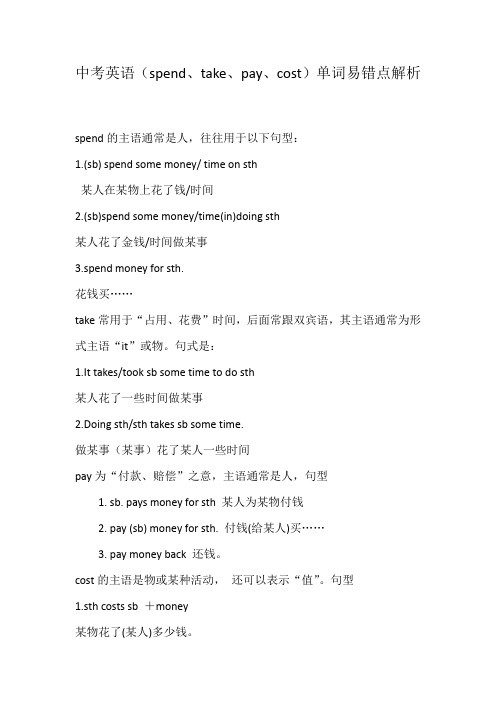
中考英语(spend、take、pay、cost)单词易错点解析
spend的主语通常是人,往往用于以下句型:
1.(sb) spend some money/ time on sth
某人在某物上花了钱/时间
2.(sb)spend some money/time(in)doing sth
某人花了金钱/时间做某事
3.spend money for sth.
花钱买……
take常用于“占用、花费”时间,后面常跟双宾语,其主语通常为形式主语“it”或物。
句式是:
1.It takes/took sb some time to do sth
某人花了一些时间做某事
2.Doing sth/sth takes sb some time.
做某事(某事)花了某人一些时间
pay为“付款、赔偿”之意,主语通常是人,句型
1. sb. pays money for sth 某人为某物付钱
2. pay (sb) money for sth. 付钱(给某人)买……
3. pay money back 还钱。
cost的主语是物或某种活动,还可以表示“值”。
句型
1.sth costs sb +money
某物花了(某人)多少钱。
【中考英语常考易错点】专题一名词
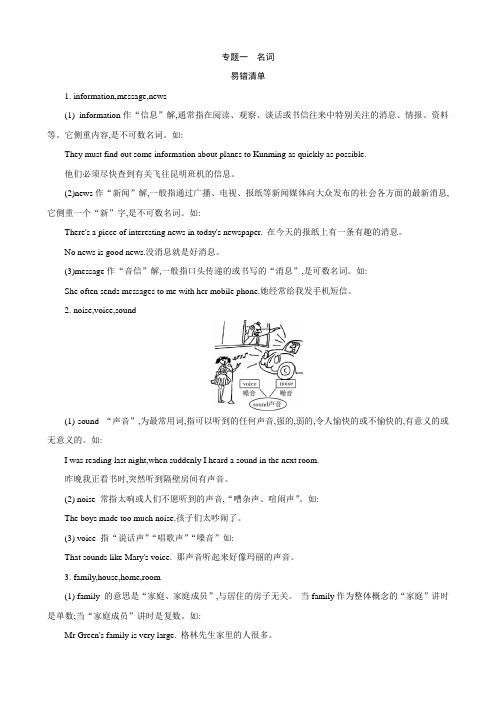
专题一名词易错清单1. information,message,news(1) information作“信息”解,通常指在阅读、观察、谈话或书信往来中特别关注的消息、情报、资料等。
它侧重内容,是不可数名词。
如:They must find out some information about planes to Kunming as quickly as possible.他们必须尽快查到有关飞往昆明班机的信息。
(2)news作“新闻”解,一般指通过广播、电视、报纸等新闻媒体向大众发布的社会各方面的最新消息,它侧重一个“新”字,是不可数名词。
如:There's a piece of interesting news in today's newspaper. 在今天的报纸上有一条有趣的消息。
No news is good news.没消息就是好消息。
(3)message作“音信”解,一般指口头传递的或书写的“消息”,是可数名词。
如:She often sends messages to me with her mobile phone.她经常给我发手机短信。
2. noise,voice,sound(1) sound “声音”,为最常用词,指可以听到的任何声音,强的,弱的,令人愉快的或不愉快的,有意义的或无意义的。
如:I was reading last night,when suddenly I heard a sound in the next room.昨晚我正看书时,突然听到隔壁房间有声音。
(2) noise 常指太响或人们不愿听到的声音,“嘈杂声、喧闹声”。
如:The boys made too much noise.孩子们太吵闹了。
(3) voice 指“说话声”“唱歌声”“嗓音”如:That sounds like Mary's voice. 那声音听起来好像玛丽的声音。
中考英语易错考点---词义辨析
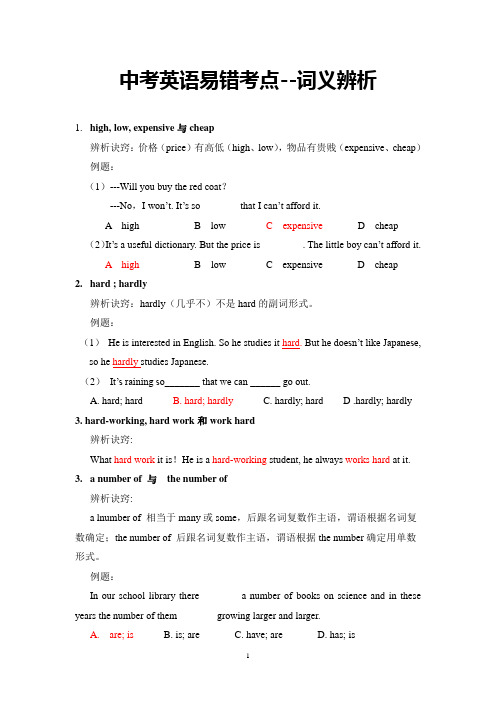
中考英语易错考点--词义辨析1.high, low, expensive与cheap辨析诀窍:价格(price)有高低(high、low),物品有贵贱(expensive、cheap)例题:(1)---Will you buy the red coat?---No,I won’t. It’s so _______ that I can’t afford it.A highB lowC expensiveD cheap (2)It’s a useful dictionary. But the price is ________. The little boy can’t afford it.A highB lowC expensiveD cheap2.hard ; hardly辨析诀窍:hardly(几乎不)不是hard的副词形式。
例题:(1)He is interested in English. So he studies it hard.But he doesn’t like Japanese, so he hardly studies Japanese.(2)It’s raining so_______ that we can ______ go out.A. hard; hardB. hard; hardlyC. hardly; hard D .hardly; hardly3. hard-working, hard work和work hard辨析诀窍:What hard work it is!He is a hard-working student, he always works hard at it. 3. a number of 与the number of辨析诀窍:a lnumber of 相当于many或some,后跟名词复数作主语,谓语根据名词复数确定;the number of 后跟名词复数作主语,谓语根据the number确定用单数形式。
中考初中英语易错题易错点易混点集锦大全精选
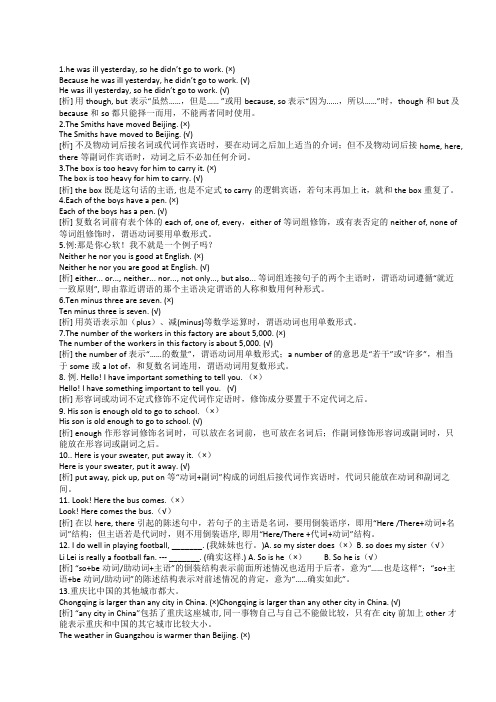
1.he was ill yesterday,so he didn’t go to work.(×)Because he was ill yesterday,he didn’t go to work.(√)He was ill yesterday,so he didn’t go to work.(√)[析]用though,but表示“虽然……,但是……”或用because,so表示“因为……,所以……”时,though和but及because和so都只能择一而用,不能两者同时使用。
2.The Smiths have moved Beijing.(×)The Smiths have moved to Beijing.(√)[析]不及物动词后接名词或代词作宾语时,要在动词之后加上适当的介词;但不及物动词后接home,here, there等副词作宾语时,动词之后不必加任何介词。
3.The box is too heavy for him to carry it.(×)The box is too heavy for him to carry.(√)[析]the box既是这句话的主语,也是不定式to carry的逻辑宾语,若句末再加上it,就和the box重复了。
4.Each of the boys have a pen.(×)Each of the boys has a pen.(√)[析]复数名词前有表个体的each of,one of,every,either of等词组修饰,或有表否定的neither of,none of 等词组修饰时,谓语动词要用单数形式。
5.例:那是你心软!我不就是一个例子吗?Neither he nor you is good at English.(×)Neither he nor you are good at English.(√)[析]either...or...,neither...nor...,not only...,but also...等词组连接句子的两个主语时,谓语动词遵循“就近一致原则”,即由靠近谓语的那个主语决定谓语的人称和数用何种形式。
【中考英语 易错题】易错点02 冠词(解析版)
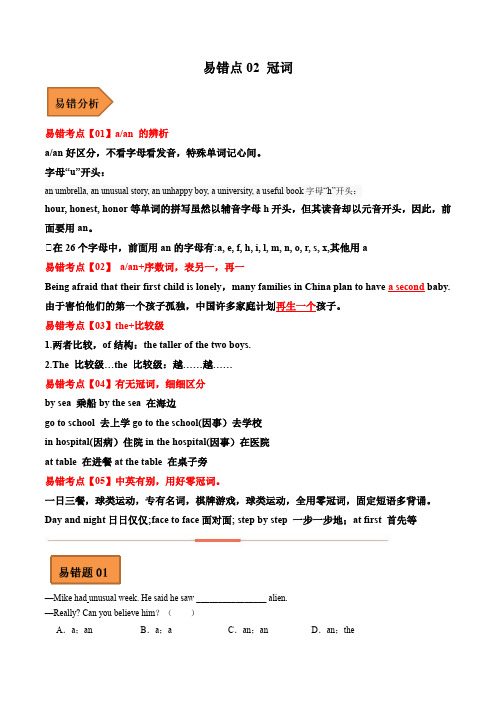
易错点02 冠词易错考点【01】a/an 的辨析a/an好区分,不看字母看发音,特殊单词记心间。
字母“u”开头:an umbrella, an unusual story, an unhappy boy, a university, a useful book字母“h”开头:hour, honest, honor等单词的拼写虽然以辅音字母h开头,但其读音却以元音开头,因此,前面要用an。
②在26个字母中,前面用an的字母有:a, e, f, h, i, l, m, n, o, r, s, x,其他用a易错考点【02】a/an+序数词,表另一,再一Being afraid that their first child is lonely,many families in China plan to have a second baby. 由于害怕他们的第一个孩子孤独,中国许多家庭计划再生一个孩子。
易错考点【03】the+比较级1.两者比较,of结构:the taller of the two boys.2.The 比较级…the 比较级:越……越……易错考点【04】有无冠词,细细区分by sea 乘船by the sea 在海边go to school 去上学go to the school(因事)去学校in hospital(因病)住院in the hospital(因事)在医院at table 在进餐at the table 在桌子旁易错考点【05】中英有别,用好零冠词。
一日三餐,球类运动,专有名词,棋牌游戏,球类运动,全用零冠词,固定短语多背诵。
Day and night日日仅仅;face to face面对面; step by step 一步一步地;at first 首先等—Mike had unusual week. He said he saw ________________ alien.—Really? Can you believe him?()A.a;an B.a;a C.an;an D.an;thea修饰以辅音音素开头的单词,an修饰以元音音素开头的单词,the 表示特指;因为week是单数可数名词,结合关键词unusual ,其首字母u发元音,故第一空填an。
中考初中英语易混易错词汇总结
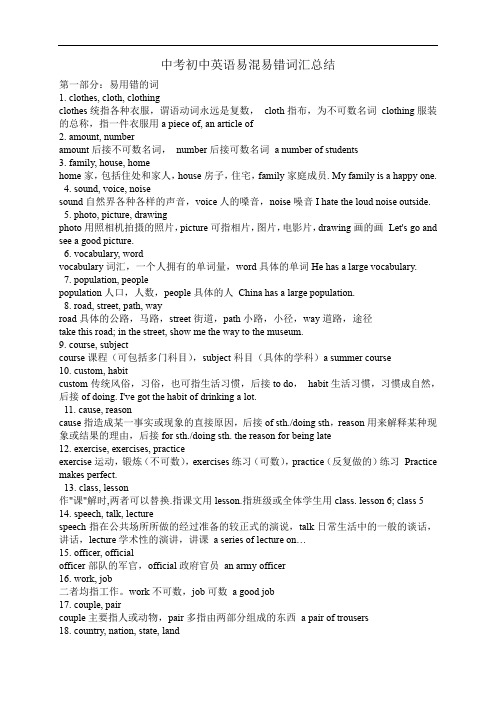
中考初中英语易混易错词汇总结第一部分:易用错的词1. clothes, cloth, clothingclothes统指各种衣服,谓语动词永远是复数,cloth指布,为不可数名词clothing服装的总称,指一件衣服用a piece of, an article of2. amount, numberamount后接不可数名词,number后接可数名词a number of students3. family, house, homehome家,包括住处和家人,house房子,住宅,family家庭成员. My family is a happy one.4. sound, voice, noisesound自然界各种各样的声音,voice人的嗓音,noise噪音I hate the loud noise outside.5. photo, picture, drawingphoto用照相机拍摄的照片,picture可指相片,图片,电影片,drawing画的画Let's go and see a good picture.6. vocabulary, wordvocabulary词汇,一个人拥有的单词量,word具体的单词He has a large vocabulary.7. population, peoplepopulation人口,人数,people具体的人China has a large population.8. road, street, path, wayroad具体的公路,马路,street街道,path小路,小径,way道路,途径take this road; in the street, show me the way to the museum.9. course, subjectcourse课程(可包括多门科目),subject科目(具体的学科)a summer course10. custom, habitcustom传统风俗,习俗,也可指生活习惯,后接to do,habit生活习惯,习惯成自然,后接of doing. I've got the habit of drinking a lot.11. cause, reasoncause指造成某一事实或现象的直接原因,后接of sth./doing sth,reason用来解释某种现象或结果的理由,后接for sth./doing sth. the reason for being late12. exercise, exercises, practiceexercise运动,锻炼(不可数),exercises练习(可数),practice(反复做的)练习Practice makes perfect.13. class, lesson作"课"解时,两者可以替换.指课文用lesson.指班级或全体学生用class. lesson 6; class 5 14. speech, talk, lecturespeech指在公共场所所做的经过准备的较正式的演说,talk日常生活中的一般的谈话,讲话,lecture学术性的演讲,讲课 a series of lecture on…15. officer, officialofficer部队的军官,official政府官员an army officer16. work, job二者均指工作。
【中考英语 易错题】易错点01 名词(原卷及答案)

易错点01 名词易错考点【01】词义辨析在中考中,对于名词的考查,更多集中在具体语言环境下名词词义的辨析上。
结合中考,可以看出,多数学生出错,是由于没能准确掌握形(义)近词的细微差别,或不善于结合具体语言环境中加以辨析,而导致失分,建议单词默写时,能做到看英识汉,看汉默英,结合语境,灵活运用。
...................牢记:只有把单词放入语境,单词才有灵魂。
易错考点【02】可数名词的数可数名词数的考查,中考永恒的考点,而学生错误,更多的是对于特殊单词的复数变化规则掌握不牢造成的。
如:不规则变化,单复同形,同形复数与规则复数的意义变化,国人复数的变化等。
建议多背多用,借助口诀,巧妙记忆。
可数名词变复数的不规则变化fish鱼sheep羊deer鹿“某国人”的复数形式:中日不变英法变,其余S加后面。
中日不变:a Chinese- --two Chinese a Japanese---four Japanese英法变:an Englishman --- three Englishmen 3个英国人其余S加后面: a German- --five Germans 5个德国人易错考点【03】不可数名词的量出错原因,主要是由于单复数不能正确区分,或对于不可数名词量方法掌握不牢。
突破方法:变复只变计量单位。
可不可数区分口诀:名词分两半,能把原名叫,就是不可数。
如:water, 分成两半,还是water,所以是不可数名词。
易错考点【04】名词所有格记牢名词所有格的不同表达法。
's口诀:分别所有分别's,公共所有最后's,s结尾只加'。
学生失分的主要原因,是对所有格加‘s的规律掌握不牢固,或是不能通过语境来确定是公共所有还是分别所有。
A 12-year-old boy from Hunan invented a new kind of window because of his _________.The window can prevent children from falling out.A.c ommunicationB. celebrationC. honestyD. creativity答案详解:由于句意没有理清,容易出错。
2023年中考英语语法易错高频考点汇总
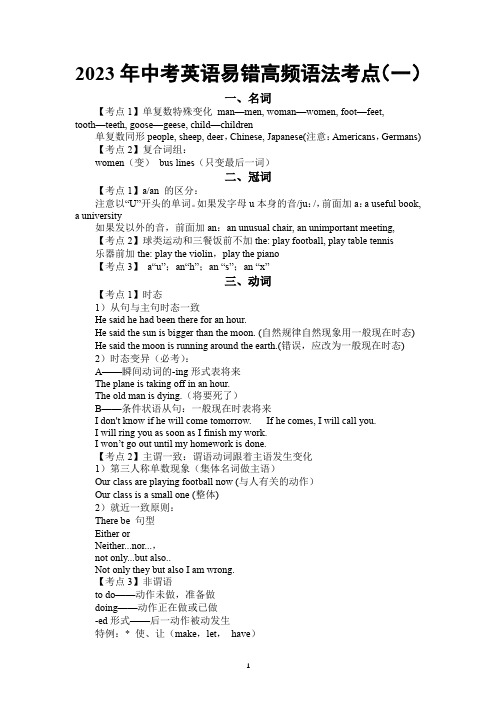
2023年中考英语易错高频语法考点(一)一、名词【考点1】单复数特殊变化man—men, woman—women, foot—feet, tooth—teeth, goose—geese, child—children单复数同形people, sheep, deer,Chinese, Japanese(注意:Americans,Germans)【考点2】复合词组:women(变)bus lines(只变最后一词)二、冠词【考点1】a/an 的区分:注意以“U”开头的单词。
如果发字母u本身的音/ju:/,前面加a:a useful book, a university如果发以外的音,前面加an:an unusual chair, an unimportant meeting,【考点2】球类运动和三餐饭前不加the: play football, play table tennis乐器前加the: play the violin,play the piano【考点3】a“u”;an“h”;an “s”;an “x”三、动词【考点1】时态1)从句与主句时态一致He said he had been there for an hour.He said the sun is bigger than the moon. (自然规律自然现象用一般现在时态)He said the moon is running around the earth.(错误,应改为一般现在时态)2)时态变异(必考):A——瞬间动词的-ing形式表将来The plane is taking off in an hour.The old man is dying.(将要死了)B——条件状语从句:一般现在时表将来I don't know if he will come tomorrow. If he comes, I will call you.I will ring you as soon as I finish my work.I won’t go out until my homework is done.【考点2】主谓一致:谓语动词跟着主语发生变化1)第三人称单数现象(集体名词做主语)Our class are playing football now (与人有关的动作)Our class is a small one (整体)2)就近一致原则:There be 句型Either orNeither...nor...,not only...but also..Not only they but also I am wrong.【考点3】非谓语to do——动作未做,准备做doing——动作正在做或已做-ed形式——后一动作被动发生特例:* 使、让(make,let,have)主动不带to,被动带tomake sb. do /make sb not do/be made to dolet sb. do【出处:】* The teacher asked the students to stop talking and to listen to her.原创作品* I have my car repaired.(我请人修理了我的车。
2024年上海中考英语冲刺易错知识点易错题(学生版)
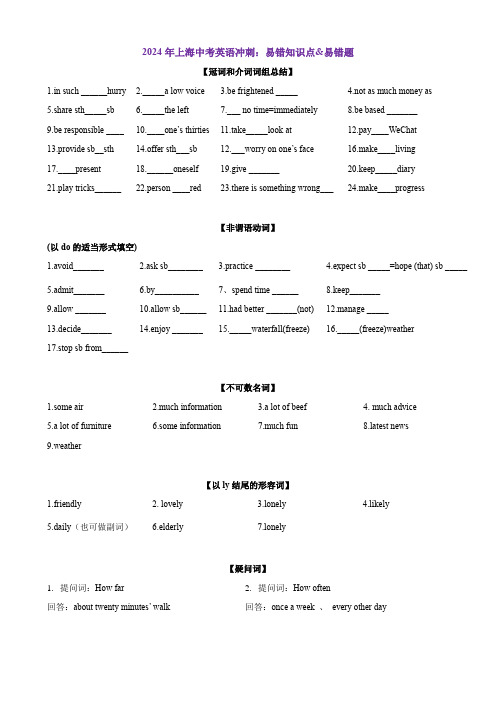
2024年上海中考英语冲刺:易错知识点&易错题【冠词和介词词组总结】1.in such ______hurry2._____a low voice3.be frightened _____4.not as much money as5.share sth_____sb6._____the left7.___ no time=immediately8.be based _______9.be responsible ____10.____one’s thirties11.take_____look at12.pay____WeChat13.provide sb__sth14.offer sth___sb12.___worry on one’s face16.make____living17.____present18.______oneself19.give _______20.keep_____diary21.play tricks______22.person ____red23.there is something wrong___24.make____progress【非谓语动词】(以do的适当形式填空)1.avoid_______2.ask sb________3.practice ________4.expect sb _____=hope (that) sb _____5.admit_______6.by__________7、spend time ______8.keep_______9.allow _______10.allow sb______11.had better _______(not)12.manage _____13.decide_______14.enjoy _______15._____waterfall(freeze)16._____(freeze)weather17.stop sb from______【不可数名词】1.some air2.much information3.a lot of beef4. much advice5.a lot of furniture6.some information7.much funtest news9.weather【以ly结尾的形容词】1.friendly2. lovely3.lonely4.likely5.daily(也可做副词)6.elderly7.lonely【疑问词】1.提问词:How far回答:about twenty minutes’ walk 2.提问词:How often回答:once a week 、every other day3.提问词:How回答:with the help of the map 4.提问词:How long 回答:1)for one year2)Since 20155.提问词:How soon?回答:in five weeksIn five days6.提问词:Why回答:in order to doto do【形容词的发音】(选填a/an)1.____exhausting day2.__useful suggestion3.what _____pity4._____European palace5._____unique day6._____usual day7.____unusual day8.____oneeyed person【情景问答】1、you are wele1)Thanks very much for your help.2)Can I join you? 2、good idea1)Shall we join in the......?2)I think we should raise some money for....3、That’s all right4、not at all1)would you mind me doing ......5、It doesn’t matter1)I am sorry to interrupt you 6.No problem1)Can you help me withe the luggage?7.sure,I’d love to1)Would you like to join us?8.Okay,anytime1)Would you e and pick me up?9.What’s the matter?1)I can’t attend tomorrow’s speech.10.Never mind.1)I am really sorry ...【题干中出现的罕见词】bel2.unique3.thanks to...4.luggage5.heavy traffic 6 fort7.daily routine8.include9.refer to【不规则动词】2、plan_________________ 3.rise________________ 1、fall_______________区别:feel_______________4.wake_______________5.sink________________【比较级的修饰词】形容词/副词比较级、最高级1.even more important2.much younger3.much heavier4.far/still/a bit/a lot+比较级【反义疑问句中出现的否定词】1.hardly2.seldom3.rarely4.few5.little6.never【同义句】1、so...that/...enough to do..../too...to do...1)The suitcase was too heavy for her to lift.(保持句意基本不变)The suitcase was _______ heavy _______ she couldn’t lift it.2)Jack ran so fast that he caught the early train to the city.(保持句意基本不变)Jack ran_________ _________to catch the early train to the city3) I was too frightened to think clearly after I heard a terrible sound. (保持句意基本不变)I was ________ frightened ________ I could hardly think clearly after I heard a terrible sound.2、同义短语:delay =put off 推迟1)The school sports meeting was delayed because of the bad weather. (保持句意基本不变)The school sports meeting was ________ ________ because of the bad weather.3、sb spend sometime doing sth =It takes sb sometime to do sth1)We spent a whole month reviewing all the subjects before the examination. (保持句意基本不变)It ________ us a whole month to ________ all the subjects before the examination.4、like A better than B =Prefer A to B1)The kids like their friends’ plan for the party better than their parents’.(保持句意基本不变)The kids________ their friends’ plan for the party ________ their parents’.5、start doing sth=take up doing sth1)Would you like to start a new hobby when you go to another country? (保持句意基本不变)Would you like to ________ ________ a new hobby when you go to another country?6、have no idea about...=don’t know about...1). Max had no idea about how to choose a pair of fortable shoes.(保持句意基本不变)Max ________ ________about how to choose a pair of fortable shoes.7、where+从句=where to do ...1)Could you tell me where I can exchange money for travelling abroad?(改为简单句)Could you tell me__________ __________exchange money for travelling abroad?【连词成句中出现的特殊句式】1.find n./pron.+adj./n.+to do sth 用在作文中I find it great fun to achieve something through hard work.2、be sure that+从句肯定......People were sure that the detective could find out the truth.3、动名词作主语Eating too much chocolate is bad for our teeth.4、It is a good idea to do...It is a good idea to listen to light music before bedtime.5、It takes sb sometime to do sthIt took Kitty a lot of time to do word puzzles last summer holiday.【并列句翻译】or否则......1、We need to do something soon,or the problem will get worse.2、Remember to book a ticket online ahead, or you will have to queue up for getting on.3、Just leave the key to the exercises behind,or you will be dependent on it.but虽然......,但是......1、I have already asked him twice, but he hasn’t given me any reply.2、Tina bought lots of interesting books, but she didn’t have time to read them.3、“I’d like to go to the concert with you tonight, _________ I’m too busy.” Ann said to me.4、I knew it was only a model, but it looked very real.【状语从句翻译】so that ... 为了....结果....这样的话....1、We decided to see the town on a guided tour so that someone would show us the sights.2、We should arrive at the airport two hours earlier so that we can have enough time to checkwhile 当....在;在...同时在....1、Tony was drawing a picture while I was doing my homework at that time.for conj.因为......1、We had to wait outside, for all the seats in the shop were taken already.though 虽然...,但是......1、The old man still coughs a lot though he has taken some medicine for a couple of days.2、Though they followed the map, they couldn’t find the small village easily.because 因为......,所以......1、Lisa doesn't like watching TV programs because there are too many ads.2、The Blacks are not going on holiday this year, mainly because they can’t afford it.Unless 除非......,(否则)......Sandy usually sleeps with the window open ________ it’s really cold.【易错题】1、Our decision ___ for some drink made us late for the train.A. stopB. to stopC. stoppingD. to stopping2、As a result of the bloods, six people died and thousands were made _______.(home)3、A good travel agent knows that a _______ customer will always e back.(satisfying)4、She felt very happy when she heard Victor’s voice on the line.(保持句意基本不变)_______ _______ great joy, she heard Victor’s voice on the line.I was surprised to see my sister’s photograph on a magazine cover. (保持句意基本不变)_________ my _________ , I saw my sister’s photograph on a magazine cover.5、Jack looked _________ at his report. He failed in the maths exam again.A. lovelyB. friendlyC. sadlyD. lonely6、Mountainclimbing is an _________ activity for young people during holidays. (enjoy)7、All of us know that Thomas Edison was a great _________ of electric lights. (invent)8、Sometimes we can get so much pleasure from the _________ knowledge. (useful )9、There are a lot of beautiful trees and flowers along the street nowadays. (改为一般疑问句)_________ there _________ beautiful trees and flowers along the street nowadays?10、Dad has brought us a surprise piece of news. (改为感叹句)_________ _________ surprise piece of news Dad has brought us!11、You cannot watch TV tonight unless you have done your homework. (保持句意基本不变)You cannot watch TV tonight _________ you _________ done your homework.12、At first, he didn’t know what to do in the new group. (改为复合句)At first, he didn’t know what _________ _________ do in the new group.13、–Would you like me to lock the door for you?_________.A.Yes, I’d like toB. It’s a pleasureC.Yes, pleaseD. It doesn’t matter14、We learned about the life of the famous_________ from this film. (invent)15、________ 800word paper on the desk doesn’t belong to me. It is my friend Amy’s.A. AB. AnC. TheD. /16、Tim rushed into his room, with a cup in one hand and some books in his ________ hand.A. anotherB. the otherC. othersD. other17、Mum looked ________ at Mary’s school report because she made great progress this term.A. happyB. happilyC. sadD. sadly18、Please tell Daisy to call me when she________ back to Shanghai tomorrow afternoon.A. esB. cameC. will eD. have e19、The good news our basketball team has won a game spread fast in our school, ________ it?A. don’tB. didn’tC. won’tD. hasn’t20、Going to climb mountain alone has been a dream of ________ since she was young. (she)21、Tony is a/an ________ boy, so few of his classmate wants to play with him. (honest)22、The doctor decided to ________ Tim’s brain at once to see if there was something wrong. (exam)23、The old couple took the map of the world with_________ for a longtime journey.A. themB. theirC. theirsD.themselves24、_________ unique dinner we've had in the famous hotpot restaurant!A. WhatB. What aC. What anD. How25、You will not achieve your goal unless you_________ hard without stop.A. workB. are workingC. have workedD. will work26、The delivery fee should be paid according to the_________ of the package (weigh)27、The new technology helps enrich book_________ in local libraries.(collect)28.After years of practice, the new traffic rules are_________ accepted by local people.(wide)29. Jenny designed the school decoration again. She didn’t make a plaint.(保持句意基本相向)Jenny designed the school decoration again_________ _________a plaint.30.Burry often introduces interesting books to his students so as to ________their minds.(wide)31.Some developing countries are in great need of ________ care for children. (medicine)32.Zak was ________ hurt in the car accident because of the driver’s carelessness. (serious)33. They say it’s an exciting puter game, but I have never played it _________. (my)34. If you don’t help________, I can’t finish the work in time.A. IB. myC. meD. mine35.With the effort of the government, we’ll have ________ reason to believe that the problem of airpollution will be solved.A. someB. everyC. eachD. other36.The sense of ________ helps us keep our balance so that we do not fall down.A. sightB. smellingC. hearingD. direction37. The ________ kids learn to be independent, the better it is for their future. (early)38.Sue ________ dancing for eight years when she won the first place in the talent show.A. learnsB. learntC. has learntD. had learnt39. Jill,let’s make some special gifts for our mother’s birthday, ________?A. shall weB. will youC. do youD. will we40. The government has made a ________to set up a new middle school in our district.(decide)41. There are many farmer ________ in Fengjing Town, Jinshan. (art)42.Which of the following underlined parts is different in pronunciation from the others?A. breathB. headC. deathD. beach43.Mary read the English text twice last night. (改为反义疑问句)Mary read the English text twice last night,__________ __________?44.Jackson had_________ simple breakfast and left hotel early in the morning.A. aB. anC. theD./45.The salesman showed her several bags and she chose_________ one as she didn’t want to spend too much money on it.A. less expensiveB. more expensiveC. the least expensiveD. the more expensive46. Mrs .Green looked_________ at her son, feeling sorry for not telling him the truth.A. sadB. sadlyC. happyD. happily47.Jerry used to be poor at English._________ He has made in learning English now!A. What a great progressB. What great progressC. How great a progressD. How great progress48. Linda, please put the book back on the bookshelf, _________?A. do youB. will youC. doesn’t sheD. shall we49.Tina's mother bought her a nice dress yesterday, and now she is dressing_________ . (she)50. Many people believe that it is_________ to ask about a woman's age.(polite)51. Tom needed an_________ on his right leg after the traffic accident, (operate)52. The earthquake_________ destroyed the old buildings in this area, (plete)53. Although the medical treatment has proved to be_________ , the patient hasn't given up yet. (use)54. They didn’t tell me about the terrible accident happened this morning.(改为被动语态)I_________ _________about the terrible accident happened this morning.55.We hope that we will get the first prize in the ing speech contest.(改为简单句)Our hope is_________ the first prize in the ing speech contest.。
中考英语之易混淆词汇知识点辨析
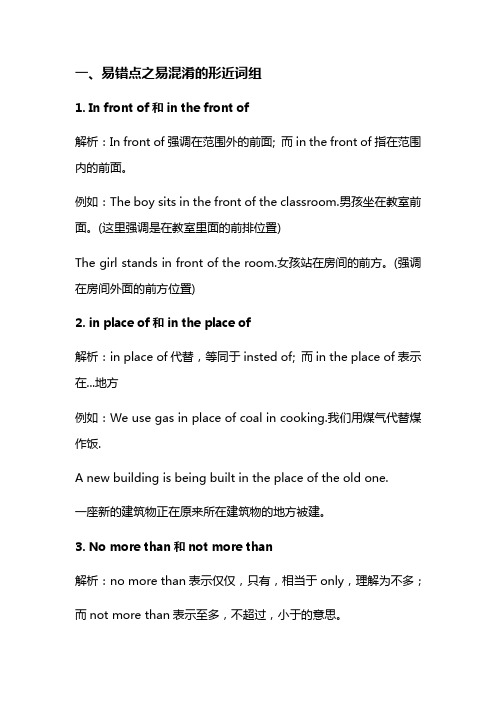
一、易错点之易混淆的形近词组1.In front of和in the front of解析:In front of强调在范围外的前面; 而in the front of指在范围内的前面。
例如:The boy sits in the front of the classroom.男孩坐在教室前面。
(这里强调是在教室里面的前排位置)The girl stands in front of the room.女孩站在房间的前方。
(强调在房间外面的前方位置)2.in place of和in the place of解析:in place of代替,等同于insted of; 而in the place of表示在...地方例如:We use gas in place of coal in cooking.我们用煤气代替煤作饭.A new building is being built in the place of the old one.一座新的建筑物正在原来所在建筑物的地方被建。
3.No more than和not more than解析:no more than表示仅仅,只有,相当于only,理解为不多;而not more than表示至多,不超过,小于的意思。
例如:He is no more than an ordinary English teacher. 他只不过是个普通的英文老师。
He has not more than three children. 他最多3 个孩子(有或许还不到三个)4.On earth和on the earth解析:两者都有在地上,在地球上的意思,但on earth还有到底,究竟的意思;On the earth只是单纯的表示在地上,在地球上例如:where on earth did you spring from?你究竟从哪里冒出来的?What if there was no lead on the earth at all?如果地球上根本就没有铅这种物质怎么办?5.At all和after all解析:at all表示根本,全然的意思,常用短语not at all表示一点也不;after all表示到底,毕竟的意思例如:I don't know him at all. 我根本不认识他。
中考英语易错知识点
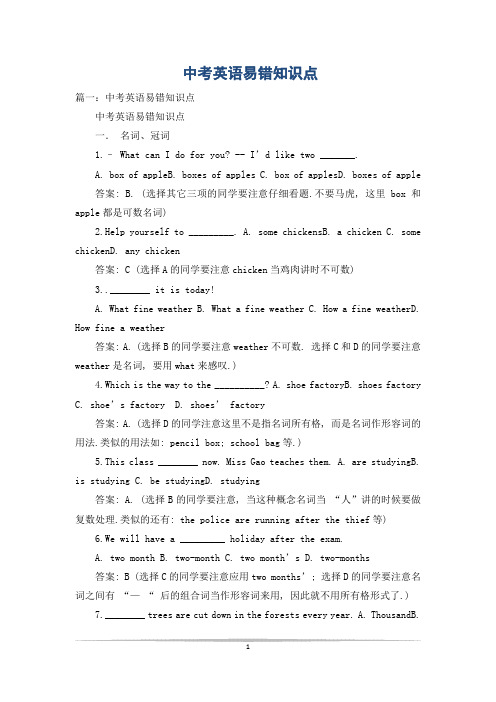
中考英语易错知识点篇一:中考英语易错知识点中考英语易错知识点一.名词、冠词1.– What can I do for you? -- I’d like two _______.A. box of appleB. boxes of applesC. box of applesD. boxes of apple答案: B. (选择其它三项的同学要注意仔细看题.不要马虎, 这里box 和apple都是可数名词)2.Help yourself to _________. A. some chickensB. a chicken C. some chickenD. any chicken答案: C (选择A的同学要注意chicken当鸡肉讲时不可数)3..________ it is today!A. What fine weatherB. What a fine weatherC. How a fine weatherD. How fine a weather答案: A. (选择B的同学要注意weather不可数. 选择C和D的同学要注意weather是名词, 要用what来感叹.)4.Which is the way to the __________? A. shoe factoryB. shoes factoryC. shoe’s factoryD. shoes’ factory答案: A. (选择D的同学注意这里不是指名词所有格, 而是名词作形容词的用法.类似的用法如: pencil box; school bag等.)5.This class ________ now. Miss Gao teaches them. A. are studyingB. is studying C. be studyingD. studying答案: A. (选择B的同学要注意, 当这种概念名词当“人”讲的时候要做复数处理.类似的还有: the police are running after the thief等)6.We will have a _________ holiday after the exam.A. two monthB. two-monthC. two month’sD. two-months答案: B (选择C的同学要注意应用two months’; 选择D的同学要注意名词之间有“—“ 后的组合词当作形容词来用, 因此就不用所有格形式了.) 7.________ trees are cut down in the forests every year. A. ThousandB.ThousandsC. Thousand ofD. Thousands of答案: D. (选择C的同学注意词组记忆的准确性)8.Our sports meeting will be held ________.A. on 24, Tuesday, AprilB. in April 24, TuesdayC. on Tuesday, April 24D. in April Tuesday 249_________ people here are very friendly to us. A. The B. / C. A D. An答案: A. (选择B的同学要注意这里的people是特指这里的, 因此要用定冠词the)10..There is no enough ________ in the corner to put the table.A. placeB. roomC. floorD. ground答案:B (根据句意知道,这里表示没有地方放桌子。
中考英语语法易错点100例
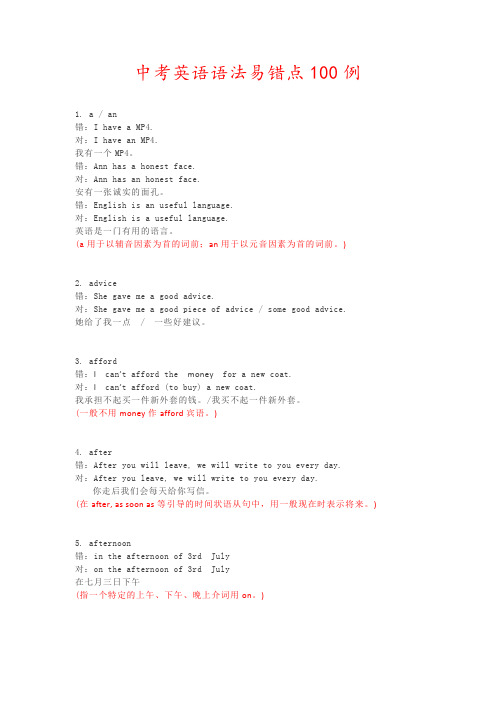
中考英语语法易错点100例1. a / an错:I have a MP4.对:I have an MP4.我有一个MP4。
错:Ann has a honest face.对:Ann has an honest face.安有一张诚实的面孔。
错:English is an useful language.对:English is a useful language.英语是一门有用的语言。
(a用于以辅音因素为首的词前;an用于以元音因素为首的词前。
)2. advice错:She gave me a good advice.对:She gave me a good piece of advice / some good advice.她给了我一点/ 一些好建议。
3. afford错:I can’t afford the money for a new coat.对:I can’t afford (to buy) a new coat.我承担不起买一件新外套的钱。
/我买不起一件新外套。
(一般不用money作afford宾语。
)4. after错:After you will leave, we will write to you every day.对:After you leave, we will write to you every day.你走后我们会每天给你写信。
(在after, as soon as等引导的时间状语从句中,用一般现在时表示将来。
)5. afternoon错:in the afternoon of 3rd July对:on the afternoon of 3rd July在七月三日下午(指一个特定的上午、下午、晚上介词用on。
)6. all错:We all were delighted when we heard the news.对:We were all delighted when we heard the news.我们听到这个消息都很高兴。
中考英语易混易错点归纳(2)
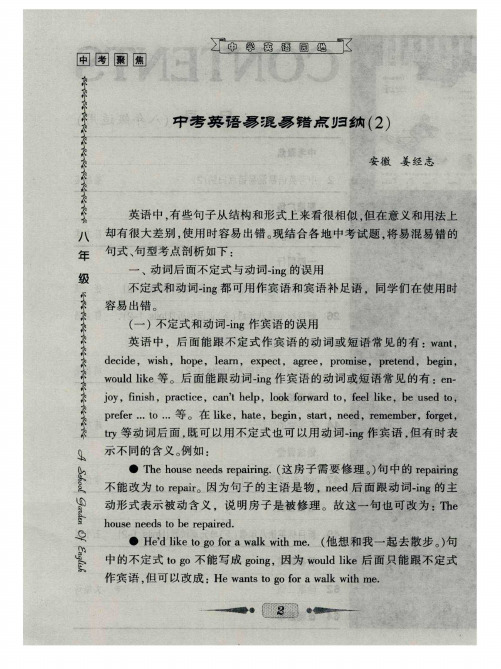
中考英 语 易 混易 镨点 归 纳 ( ) 2
安徽 姜 经志
英语中, 有些 句子 从结 构和 形式 上来 看很 相似 . 但在 意义 和用 法上
使 现 将 八 却有很 大差别 , 用 时容 易 出错 。 结 合各 地 中考 试 题 , 易混 易错 的
在
句式 、 型考点 剖析 如下 : 句
墼
动 形式 表 示被 动 含 义 ,说 明房 子 是被 修 理 。故 这 一 句 也可 改 为 : h Te
h u e n e o b e ar d. o s e dst e r p ie
● H ’ l et g raw l i e ( e k of akwt m . 他想 和我 一起 去 散 步 。 句 di o o h )
—
—
a o e th m
— —
o uc a n a . n s h a r i y d y
A. t h T ;t o o t wac V o g u C. t h g TV;t on u wac i og ig o t
能跟动 词. g 宾语 。 i 作 n
● R m m e r f tel h h ny ul v ec sro .( e e b r ot no g t e o a et l s m 记 t u h i w e h a o
住 当你 离 开教 室 的 时 候要 关 灯 。 )句 中 的 t r f 不 能 写 成 trig ot n o u u n n
八 年
● S ei ue e igu al. 她 习惯早 起 。 句 中 的 t gtn 级 h sdt gtn per ( s o t y ) o et g i
【 中考链接 】
中考英语易错知识点

中考英语易错知识点一、时态与语态1. 一般现在时与现在进行时的混淆- 易错点:描述经常发生的动作或状态时误用现在进行时。
- 正确使用:一般现在时用于习惯性动作或普遍真理,现在进行时用于正在进行的动作。
2. 过去完成时的误用- 易错点:在没有明确过去时间点参照的情况下使用过去完成时。
- 正确使用:过去完成时表示在过去某个时间点之前已经完成的动作。
3. 被动语态的不正确使用- 易错点:在应强调行动承受者而非执行者时错误地使用主动语态。
- 正确使用:被动语态用于强调受动作影响的对象。
二、词性与词形1. 名词的单复数形式- 易错点:对于不规则变化的名词复数形式记忆不清。
- 正确使用:注意名词复数形式的变化规则,包括不规则变化和特殊名词。
2. 动词的不规则变化- 易错点:在使用过去式和过去分词时,错误地使用规则变化。
- 正确使用:掌握不规则动词的过去式和过去分词形式。
3. 形容词与副词的混淆- 易错点:在需要使用副词修饰动词时错误地使用形容词。
- 正确使用:形容词用于修饰名词,副词用于修饰动词、形容词或其他副词。
三、句型结构1. 条件句的使用- 易错点:在表达假设或条件时混淆不同类型的条件句。
- 正确使用:区分真实条件句(使用if或when)和虚拟条件句(使用if或were)。
2. 宾语从句的语序- 易错点:在宾语从句中错误地使用倒装语序。
- 正确使用:宾语从句应使用陈述句语序。
3. 定语从句的关系词- 易错点:在选择关系代词或关系副词时出错。
- 正确使用:根据先行词的指代内容和在从句中的作用选择合适的关系词。
四、词汇用法1. 同义词和近义词的区分- 易错点:在特定语境中错误地替换同义词。
- 正确使用:理解每个词汇的微妙差别和适用语境。
2. 短语动词的理解- 易错点:对短语动词的意思和用法理解不足。
- 正确使用:熟悉常用短语动词的构成和意义。
3. 介词的搭配- 易错点:在选择介词时忽视其固定搭配。
- 正确使用:掌握介词与名词、动词的固定搭配。
- 1、下载文档前请自行甄别文档内容的完整性,平台不提供额外的编辑、内容补充、找答案等附加服务。
- 2、"仅部分预览"的文档,不可在线预览部分如存在完整性等问题,可反馈申请退款(可完整预览的文档不适用该条件!)。
- 3、如文档侵犯您的权益,请联系客服反馈,我们会尽快为您处理(人工客服工作时间:9:00-18:30)。
中考常考易错题总结一:易混动词1. 几个“花费”:spend,take,pay,cost(1) spend多用人作主语,后接金钱或时间。
spend...on sth/ (in)doing sth。
如:I spent 15 yuan on this new book.买这本新书我花了15元。
(2) take常用于“It takes sb some time to do sth”句型中。
如:It often takes me half an hour to go to school by bike every day.我每天骑车去学校要花半小时。
(3) pay常与for连用,表“付给……款”。
如:I paid 15 yuan for this new book.(4) cost常用物作主语,表“价值或花费多少钱”。
如:This new book costs me 15 yuan.2. 几个“看”:look,see,watch,read,findlook看,表动作,look at。
see看见,表结果;也可说看电影“see a film”。
watch观看比赛、演出、电视等。
read读书看报等文字材料。
3. 几个与“看”有关的词或词组:look for, find, find out, look after, take care of, look over, look forward tolook for寻找,表过程。
find发现,找到,表结果。
find out找出,查明。
look after, take care of 均表示“照看,照顾”。
look over检查、翻阅等。
look forward to盼望……,期待……。
4. 几个“说”:say, speak, talk, tell(1) say用作及物动词或不及物动词。
用作及物动词时,侧重说的内容;say用作不及物动词时,不涉及所说的内容。
如:Please say it in English.这个请用英语说。
It's hard to say.很难说。
Easier said than done.说起来容易,做起来难。
say之后通常跟直接引语、间接引语或宾语从句。
如:The teacher said,“Please look at me.”老师说:“请看着我”。
Our teacher said that the earth goes around the sun.老师说地球围绕太阳运行。
含有say的固定搭配和常见的句型有:say to oneself自言自语;say“Hi/Hello”to sb.向某人问好;have nothing to say to对……无话可说;say a good word for sb.为某人说好话;They say... / It's said... (据说……);That is to say那就是说。
(2) speak常指能说某种语言,打电话时常用它表示说话,也有“演讲”的意思,不强调说话的内容。
如:We can speak Chinese and English.我们可以说汉语和英语。
May I speak to Henry?我可以和亨利讲话吗?He will speak at the meeting tonight.他将在今晚的会议上发言。
(3) talk用作不及物动词,作“说话”讲时与speak可以互换使用。
作“交谈”讲时,通常与介词to / with连用。
如:The baby can't talk yet.那个婴儿还不会讲话。
They often talk in English.他们经常用英语交谈。
I'd like to talk to her.我想和她谈一谈。
talk用作名词时,可以与动词have一起构成短语“have a talk with”,意思是“和……谈一谈”。
如:May I have a talk with you?我可以和你谈一谈吗?含talk的短语、固定搭配和句型常见有:talk to/with sb.和某人谈话;talk about谈论;have a talk with sb.和某人谈话/谈一谈;talk of谈到/讲到;talk out说完(4) tell用作及物动词,意思是“讲、说”,指说实话,说出事实的真相,讲故事等。
如: My mother often tells me stories.妈妈经常给我讲故事。
Please tell me the truth.请告诉我事实的真相。
The boy never tells lies.那个孩子从不说谎。
Nobody can tell how the Pyramids were built.没有人能说出金字塔是怎样建成的。
tell表示命令时,作“叫、告诉”讲,常见的句型是“tell sb to do sth.”,意思是“叫/告诉某人做某事”。
如:Tell him to come to my office.叫/告诉他到我的办公室来。
Tell them not to look out of the window.叫他们不要向窗外望。
含有tell的短语、固定搭配和常用句型有:tell sb. a story给某人讲故事;tell sb. about sth.告诉某人关于某事的情况;tell sb. to do sth.叫某人做某事;tell a lie说谎;tell the truth说实话。
5. 几个“穿,戴”:put on,wear,dress(up)put on指“穿上、戴上”,强调动作,代词放在中间。
wear指“穿着,戴着”,表示状态。
dress指“给某人穿衣服”,其宾语是人。
dress up 指“穿上盛装,打扮”。
6. 几个“到达”:reach,arrive in/at,get toreach是及物动词,它后面可以直接跟表示地点的名词作宾语。
arrive是不及物动词,后面接表示地点的名词作宾语时需在宾语前加介词in或at(在国家和较大的城市或地区前用in,较小的地方或单位前用at)。
get to表示到达,多用于口语中。
注意:当表示到达here,there,home时,arrive或get后不要加介词。
7. 几个“带、拿”:bring,take,get,carrybring指将某物或某人从离说话人较远处“拿来”或“带来”。
take指将某物或某人从离说话人较近处“带到”或“拿到”。
get指从说话人所在位置到别处把某物拿来。
carry不强调动作来去的方向,只说明动作方式,表示“背着、扛着、提着、载着”等含义。
8. 几个与“听”有关的词或词组:listen to,hear,hear of,hear fromlisten to 听……,表示听的动作。
hear听见,听到,表示结果。
hear of 听说……。
hear from收到某人的信息或来信。
9. beat和winbeat表示“赢”或“打败”,后面要接被打败的对手。
win用作及物动词时,后面接的不是被打败的对手,而是比赛本身、游戏、战争、名次等。
10. rise和raiserise是不及物动词,表示“上升、提高、增长”等。
raise是及物动词,表示“举起、抬起”。
11. borrow,lend和keepborrow指其逻辑主语从别处或别人那里“借来”东西,常与介词from连用。
lend指其逻辑主语将东西“借出、借给”别人,常与介词to连用。
keep表示“保存”,与表示一段时间的时间状语连用。
12. receive和acceptreceive的意思是“收到了……”,只表示收到某物,并不表明同意或不同意接受的含义。
accept表示“接受……”,“同意接纳……”,如接受物体、邀请、批评等。
如:He received an invitation from her and accepted it happily.他收到了她的邀请,并且很愉快地接受了。
13. answer与replyanswer意为“回答、响应、答复、接听电话”等,多作及物动词。
reply意为“回答、答复”,是不及物动词,后需加介词to,at等再加宾语。
14. wish,hope与expecthope指主观上的愿望,但在客观上不一定有实现的可能性,常接that从句、动词不定式或以介词for引出的短语。
expect着重指客观上有可能实现的“期待、期望”等,其后可接名词、代词、动词不定式或that从句。
Wish sb to do sth15. lie和laylie有多个意思:表示“躺;位于”时,其变化是lay,lain,lying;表示“说谎”时,其变化是lied,lied,lying。
lay的含义是“放置、产卵”等。
其变化是laid,laid,laying。
二:现在完成时与一般过去式的区别它们所表示的动作都发生在过去,但二者又有区别:一般过去时表示过去某个时间发生的事、存在的状态或经常发生的动作,说话的侧重点在于陈述一件过去的事情,与现在没有关系;现在完成时表示与现在有关系的发生在过去的动作,它不与表示明确过去时间状语(如yesterday,last week,a moment ago等)连用。
如:—These farmers have been to the United States.——这些农民去过美国了。
—Really? When did they go there?——真的吗?他们什么时候去的?—Have you finished your homework?——你完成作业了吗?—Yes,I did it a moment ago.——是的,我刚刚做的。
三:常考词组A) 词组have/has been in/to与have/has gone to的区别“have/has gone to+地点”表示“某人去了某地(还未回来)”,指主语所指的人不在这儿。
“have/has been in+地点”表示“在某地呆了多长时间”,常与表示时间段的状语连用。
“have/has been to+地点”表示“曾经去过某地(但现在已不在那儿)”。
如:My father isn't at home. He has gone to Beijing.我爸爸不在家,他去北京了。
I have been in Beijing for 10 years.我待在北京十年了。
I have been to that city,and I don't want to go there again.我去过那座城市了,我不想再去了。
B) would rather与prefer to(1) would rather相当于一个情态动词,后面跟不带to的动词不定式构成句型:would rather do sth.,意为“宁可/愿做……。
